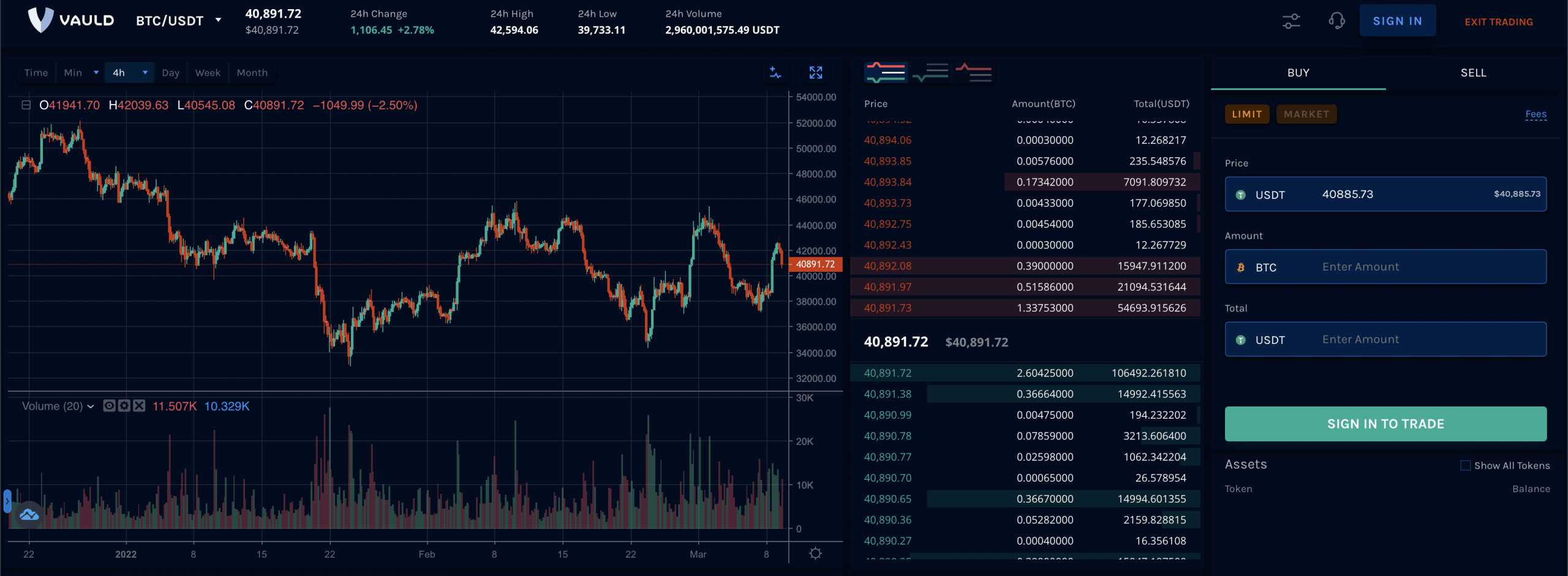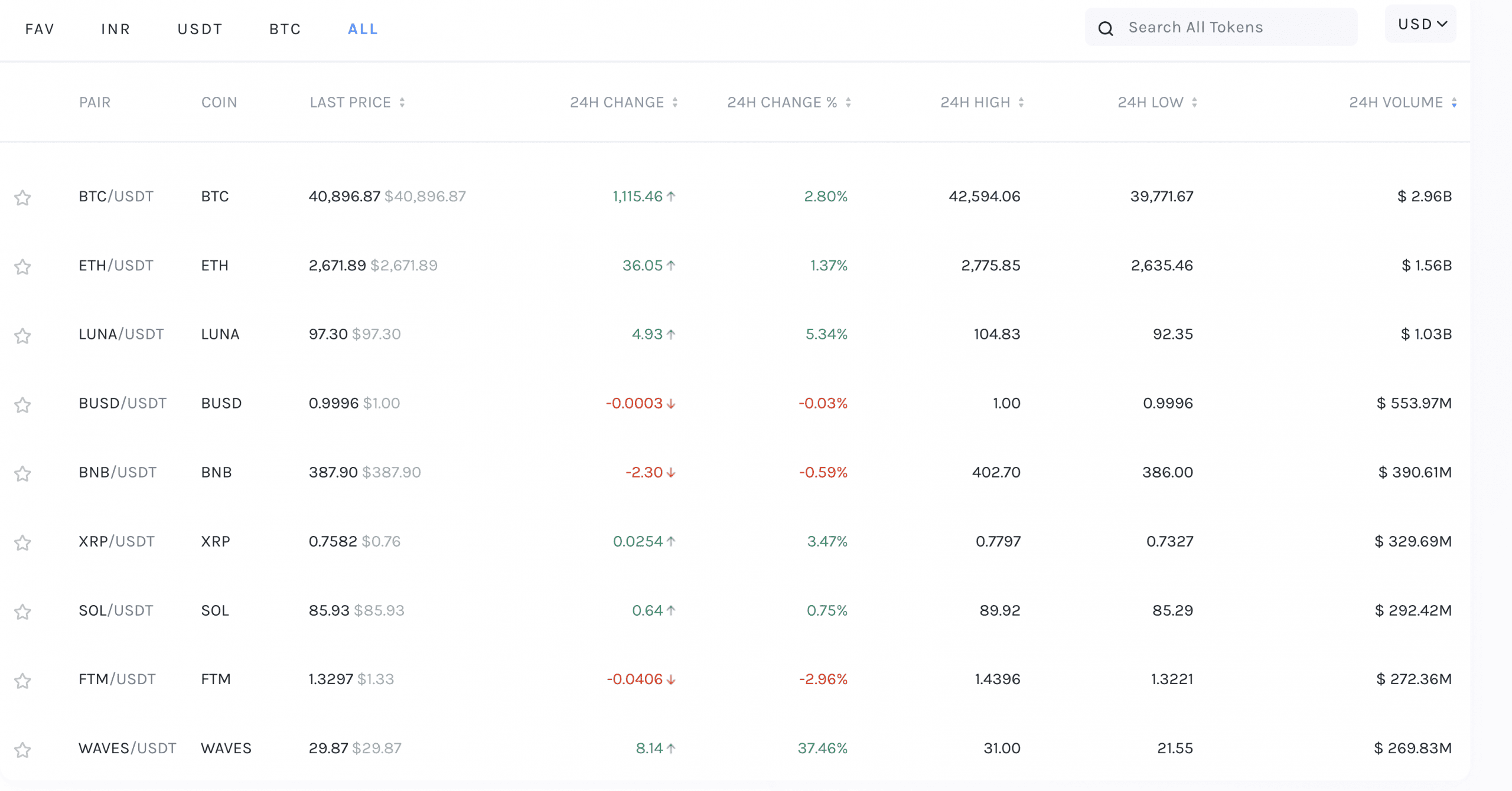![]()
Vauld is a Singapore-based cryptocurrency exchange that launched in 2018 that serves primarily the Asian and European crypto markets.
The exchange requires KYC (Know Your Customer) identity verification protocols to be completed for use of the exchange. US users can use the exchange for access to all products.
History of Vauld
Vauld has aimed to function as a full-fledged crypto financial services application since its inception. Vauld intended to enable every user to receive the core elements of the banking system in a way that the user himself or herself can control.
Since launch in 2018 when Vauld was previously called BoH and launched with only secure Bitcoin and Ethereum wallets, it added lending and borrowing functionality in 2019, first in a P2P manner, and then via a centralized pool.
Vauld then focused on the Indian market and added fiat rails in INR. In 2020, BoH was rebranded to Vauld and received institutional funding from LuneX. Vauld plans to add cards, fiat rails for USD, GBP, EUR, and SGD along with other major currencies, cross token payments, cross border remittances, and bank account support to come.
As of 2022, Vauld has achieved Series A funding in the amount of $27M USD with 12 investors and has 82 employees. The CEO and co-founder is Darshan Bathija, and the CTO and other co-founder is Sanju Sony Kurian.
Vauld is best for:
-
All types of cryptocurrency investors and spot/margin traders especially in emerging markets such as India (especially due to INR fiat rails) who desire access to a full suite of crypto financial services and banking
-
Traders and investors who desire a flat, relatively low, 0.1% standardized fee schedule, alongside the full suite of Vauld offerings such as the ability to earn interest, collateralized loans, trading, and more.
PROS
- INR fiat on- and off-ramps
- Competitive interest rates
- Competitive fees
- Weekly payouts
- No locked assets
- Fixed term deposits
- Compounded interest
- Collateralized loans
- Advanced charting and trading features
- Mobile and desktop friendly
- Community engagement
CONS
- Lack of derivates products
- Only spot trading
- Flat maker-taker fee model
- KYC required
Pros & Unique Features
The unique and best features that Vauld offers are its holistic suite of crypto financial and banking services with ease of fiat rail access to Indian users using INR currency as well competitive interest rates for lending, alongside a flat and competitive fee structure.
As for its interest product, Vauld offers weekly payouts, the ability to withdraw any amount at any time while earning interest, fixed term deposits, and compounded interest as well. APY rates are extremely competitive with USDT at 12.68% as of Feb 2022, and BTC and ETH both are 6.70%.
Vauld also offers crypto collateralized loans for users to be able to borrow against their tokens and take low interest loans. Users can take loans up to an LTV of 66.67% with instant approval, no hidden fees, and can pay back anytime with any number of installments. The loans are overcollateralized by at least 150% and typically repaid mostly in 30 days.
As for trading, Vauld offers both a full-featured exchange with advanced charting and trading features or alternatively an Instant Swap product for easy and instant trades. There is liquidity in excess of $50M, upto 0 maker and 0.05% taker fees on some products, and users can even earn interest on their tokens while trading with them.
The exchange offers over 150 coins and trading pairs in INR, USD, USDT, and BTC, which is a moderate offering size. Charting is integrated with TradingView and order books are present for more advanced traders to use. Vauld also offers mobile apps for users to be able to trade and swap anywhere and anytime for both Android and iOS.
Vauld also offers community engagement options that other exchanges do not, such as a Crypto Circle feature which is a space for people to discuss broader topics about crypto like global adoption and upcoming tokens. Developers can get support and make sense of building with APIs. The funds allocated for trading are custodied with Vauld’s exchange partners, such as Binance, for trading on their order books.
Another unique thing about Vauld is that the exchange uses a centralized pool. This means that any time a user deposits funds to his or her Vauld wallet, it goes to this pool and the funds are allocated for lending and lent out to borrowers. A float is maintained for withdrawals on the platform.
As for customer support, Vauld offers support via tickets and live chat and users can also access support via logging into the exchange. Vauld provides premium support for users who have more than $10K USD on the exchange and account managers for those with over $100K in custody.
Cons & Disadvantages
The main disadvantage of Vauld is the lack of complicated derivatives trading products. Because of this, Vauld is best suited to those looking for an alternative to other crypto financial services exchanges such as Voyager or Crypto.com, with the addition of a strong desktop-based exchange offering.
While its host of crypto financial services are limited beyond its actual market offerings, and only spot trading is offered, with no margin or futures trading, the spot trading selection is still competitive with other top exchanges.
Another disadvantage of Vauld is in its largely flat maker-taker fee model, which is set at 0.10% for both makers and takers for almost all of its coins. This means there are no tiered volume incentives or additional maker rebates, except for the case of the USDT/INR market only. This means that high volume traders, especially liquidity takers, cannot achieve lower fees than the standard fee model and market makers are not rewarded additionally for providing liquidity.
Lastly, Vauld does require KYC requirements to be completed to use the exchange for all jurisdictions as per its KYC/AML policy, so this may be a con for those looking for a KYC-free exchange.

Vauld Fees
Vauld charges a flat, standardized fee schedule on trading fees, with the fee being the same for both market makers and takers.
Trading fees are 0.1% for market makers (providers of liquidity) and 0.1% for takers (takers of liquidity). There are no incentives or tiers based on trading volume, unlike at many other exchanges.
The one exception to this standardized fee schedule is the USDT/INR trading pair which has a 0% maker fee and a 0.05% taker fee.
Additionally, unlike other exchanges, Vauld does not offer any additional rebates for market makers, which means it is not the ideal exchange for very high volume traders who could otherwise receive net rebates or pay 0 fees at other top exchanges.
Trading fees are incurred when an order is filled by the exchange’s matching engine. If an order does not execute, there is no fee charged until it does execute at a later point, or it can be canceled. The full fee schedule can be found here.
Other Fees
Vauld charges the following deposit, withdrawal, and other fees:
-
No account creation or maintenance fee
-
No deposit fees for any digital asset or for fiat deposits
-
Withdrawal fees for digital assets can be found here and range depending on the asset in question. The fees are listed as “dynamic” without a set amount listed, so they may change at the discretion of either Vauld or as a result of congestion and usage on the underlying blockchain network.
There are no fees for signing up or for having an inactive account, nor any fees for holding funds in an account, and users may hold assets as long as desired.
Account Tiers & Limits
All users of Vauld are required to undergo the same KYC verification procedures as per its KYC/AML terms. The requirements for documents for KYC can be noted below.
For KYC, users are required to submit their name, address, DOB, nationality, government-issued ID, and a valid photo holding said ID, in addition to a valid email address and a mobile phone number.
As far as account limits, since all accounts must undergo KYC, account limits are the same across accounts.
For INR fiat deposits, the minimum amount is anywhere from 1 INR to 2 Lakh INR, depending on the method. The methods are listed here under the “Our INR Deposit and Withdrawal Fees” subheading.
If withdrawing BTC, the minimum withdrawal limit is 0, while the maximum withdrawal limit is unlimited. The limits for other crypto assets can be noted here.

Crypto Security
Vauld’s funds are managed through a multi-sig system with the signatories being the co-founders. The exchange is in the process of getting licensed in Europe, Singapore, and the US within the next 6 months as well.
Almost all of the exchange’s funds are kept in a cold wallet to be almost immune to external attacks. Vauld is looking to have their security systems audited and regularly work with their partners and white listed ethical hackers to help them discover vulnerabilities in their systems.
The centralized lending pool is stored with BitGo, which is a market leader in cryptocurrency custody solutions. The pool is also insured for $100M against threats. The insurance policy covers the digital assets in the event of: third-party hacks, copying, loss or theft of private keys, insider theft or dishonest acts by their employees or executives.
There have been no reported hacks of Vauld and users are encouraged as always to use 2-factor authentication, secure passwords, a new email, and always check links for possible phishing attempts, as always.
More security information from the Vauld team can be found here.

Vauld Review Conclusion
Vauld is a great overall choice of well-rounded exchange primarily for Indian customers who need INR banking rail infrastructure. As such, it can make a great alternative to WazirX, another leading exchange for Indian customers. However, Vauld does not limit its services to only Indian customers, and US users are also allowed to use the exchange.
Vauld also offers a strong suite of crypto financial services including lending and interest products, as well as simple and advanced trading options with a large amount of cryptocurrencies to trade.
Users can enjoy both a moderate amount of spot trading options but there are no derivatives or margin products, and fees are set at a standardized and flat 0.10% for both makers and takers for almost all of its coins and trading pairs except for USDT/INR which is 0% fees for makers and 0.05% fees for takers.
Vauld requires KYC and offers excellent security with steps to obtain licensing with regulators in multiple jurisdictions.
-
Vauld offers access to 150+ cryptos and flat 0.1% trading fees for both makers and takers in only spot products, with the addition of a suite of lending and interest earning products which offer extremely competitive rates and structures
-
Intermediate to advanced traders trading margin or futures who desire access to advanced trading tools, volume-based fee tiers would prefer to pick a different exchange especially if desiring one not requiring KYC

Other Alternatives
For customers who desire access to an equally comprehensive crypto exchange that also offers a host of financial services such as staking and cashback cards, either Crypto.com, Gemini, Coinbase, and Binance can make alternatives and they are all competitors to Vauld in some form. Some of these, like Binance, also offer a greater amount of cryptocurrencies to trade along and better reputation and security.
Beginners, buy-and-hold investors, and low volume traders would prefer the easy to use features and functionality of Vauld’s Instant Swap, or the Voyager mobile app, or Coinbase.
Coinbase is best designed for buy-and-hold investors or casual to intermediate cryptocurrency users—Coinbase offers 402 pairs vs. Vauld’s 150+ coins—and offers an advanced desktop trading interface as well as a mobile app, but no futures or margin.
Active traders who need access to order books and advanced charting functionality may prefer using Coinbase Pro, FTX, Binance, or KuCoin though their fee structures and product offerings differ and most exchanges on the market use maker-taker fee schedules that give volume incentives, unlike Vauld which uses a flat fee model.
For customers who desire to trade and invest in stocks in addition to top cryptocurrencies and do not mind having a smaller selection from which to choose or only desire access to the top 20 cryptos on the market, Webull and Robinhood are brokers that offers US equities and a small selection of cryptocurrencies.
Other competitors to Vauld include OkCoin, Kraken, OKX, and eToro.
Vauld vs Coinbase
Coinbase is better for many core aspects of crypto trading and products offered if compared to Vauld, if only for the more extensive choice of coin offerings.
Coinbase also has a wider range of services suited for both new users and advanced users with Coinbase Pro, while Vauld focuses more on emerging markets with more limited coins and a slightly smaller scope of financial services, but Vauld does offer more competitive interest rates and terms.
Vauld and Coinbase both offer only spot trading. Vauld offers better fees with the standard tier offering as low as 0.1% for market makers, without any volume or rebates. Coinbase’s fee schedule requires significantly more volume to achieve such a low fee.
Coinbase also offers much more of a selection of trading pairs compared to that offered at Vauld, with 440 trading pairs, compared to ~150 coins at Vauld, as well as advanced charting, accessible order books, and advanced order types, which both exchanges offer.
Coinbase is a public US company and offers transparency into its industry-leading security along with its brand reputation, while Vauld is not regulated in the US. Both exchanges require KYC.
Advanced users who desire both competitive fees and a greater selection of trading products than what either Vauld or Coinbase offer may find the choices below equally valuable.
Vauld vs FTX
FTX will win against Vauld for all intermediate or advanced traders, as FTX offers 323 coins and 492 trading pairs, which is far higher than Vauld’s 150+ coins and lack of any futures pairs. Plus, FTX offers access to more fiat rails than Vauld’s INR-only offering.
Derivatives traders who want to trade margin, extensive crypto futures pairs, or leveraged tokens and options will prefer FTX since Vauld’s offerings here are nonexistent. Meanwhile, FTX offers a max of 20X leverage now.
FTX is known for its extensive futures pairs and top-class matching and liquidation engine for advanced derivatives traders, and traders can use third party bots at FTX as well, while Vauld does offer advanced charting and order books access, but the exchange performance and reliability cannot be compared to that of FTX.
FTX is known for catering to active derivatives traders and optimizing for high order volume and trading execution speed. While FTX cannot be used by US persons, Vauld can, but users must undergo KYC.
FTX offers a US version of its exchange whose trade offerings are far more limited than its parent global exchange and do not at all compare to FTX International’s selection, but are less equivalent to what Vauld offers, though it remains competitive in its fee. FTX US wins for US users over Vauld due to features and reputation but Vauld can be ok for more adventurous users.
International users who can use FTX International may prefer FTX. US users trading at FTX US need to do KYC procedures and likewise for Vauld. Fees may be slightly more competitive at FTX as a trader’s volume is higher, since FTX offers both fee incentives for volume and for holders of its FTT token.
Vauld vs Gemini
Gemini is more focused on its holistic crypto financial services for Americans, while Vauld serves emerging countries with the same (like India) and is not regulated, unlike the Gemini brand.
There is a difference in fees to start, giving Vauld the clear edge: the minimum fee tier at Gemini starts at 0.35% for takers and 0.10% for makers, with a flat transaction fee between $0.99-$2.99 and 1.49% transaction fee for trades over $200, so there are extra fees per transaction and extra “auction” fees, while Vauld charges flat 0.1% trading fees for market makers and 0.1% takers, which is still much lower than Gemini, even without any volume-based incentives.
Gemini offers volume incentives while Vauld does not, both as far as fees go, neither platform is competitive as compared to the global crypto market offerings.
US investors and traders are allowed to use Gemini with KYC verification only, since Gemini is regulated and based in the USA, however as a result, Gemini offers no margin or futures products. Vauld offers only spot offerings as well and also requires full KYC to use.
Gemini offers 62 coins and 86 trading pairs which is a bit smaller than the amount offered by Vauld. Another difference is the existence of Gemini’s credit card, which does not exist at Vauld, though Vauld does offer some a strong interest-earning product that surpasses that of Gemini in its rates and flexibility of its terms.
Vauld vs Kraken
Kraken offers margin trading at up to 5X leverage even for US investors and several other margin offerings, while Vauld offers none. US users may prefer Kraken for its regulatory compliance and strong track record if they are traders especially.
Kraken uses a maker-taker fee schedule, starting at 0.16% maker fees and 0.26% taker fees at the entry level which is not quite as competitive even as Vauld’s 0.1% flat fee schedule. Market makers enjoy reduced fees however at Kraken and fees also reduce with volume, which is not the case at Vauld as far as volume tiers go.
Kraken offers a greater variety of cryptocurrencies and pairs (over 90 coins, over 400 pairs), so users who value a large selection and advanced traders who seek margin will prefer Kraken over Vauld.
If an active trader wishes to trade other instruments beyond crypto and prefers not to KYC, he or she may prefer other exchanges such as OKX, but if he or she prefers a much larger selection of crypto only instruments and does not mind KYC, Kraken probably wins.
Kraken is accessible in 48 US states with KYC and is regulated and licensed by FinCEN in the USA, while worldwide users can use Vauld with KYC.
Vauld vs Binance
Binance is the leading global crypto established exchange by trading volume, offering a much larger selection of cryptocurrencies than Vauld—over 351 coins and over 1300 pairs. An easy choice for those seeking only more cryptos to trade is therefore Binance.
The two exchange’s offerings are varied in their scope, with Vauld being an exchange catering primarily to emerging markets like India, and other countries that may even be banned from Binance, while Binance is focused on being a global leader and fast innovator in every crypto product with a notable brand name behind it.
Traders looking solely for the most advanced trading options such as high leverage margin and futures products specific to crypto only will prefer Binance, as it offers many USDT futures pairs not found anywhere else besides potentially OKX or FTX.
Binance’s maker-taker fee schedule is unique in its competitiveness compared to that of other exchanges, starting at 0.1% which is the same as the flat fee tier at Vauld, plus Binance also offers further 25% reduction in fees if paid in BNB, alongside offering reduced fee tiers for higher volume and even maker rebates. Binance wins in the fee department easily due to its incentives and reductions.
Binance also offers a more extensive web and ecosystem of products, support, and liquidity, especially given its larger daily volume as compared to Vauld.
The Binance exchange is not at all accessible to US persons and US customers will have to use Binance US which is a much more limited version of its global parent site, with only 64 coins and 130 pairs, which is about equal to Vauld but with less choices, but Binance US has a better reputation.
Binance requires full KYC now to trade even spot products, and Vauld requires full KYC as well to use. Advanced traders and intermediate users alike who value a large selection of cryptocurrencies, products like staking, lending, and more, competitive fee structures, and futures and margin products will probably prefer Binance.

FAQ – Frequently Asked Questions
Is Vauld Safe?
Yes. Vauld’s funds are managed through a multi-sig system with the signatories being the co-founders. The exchange is in the process of getting licensed in Europe, Singapore, and the US within the next 6 months as well.
Almost all of the exchange’s funds are kept in a cold wallet to be almost immune to external attacks. Vauld is looking to have our security systems audited and regularly work with our partners and white listed ethical hackers to help us discover vulnerabilities in our systems.
The centralized lending pool is stored with BitGo, which is a market leader in cryptocurrency custody solutions. The pool is also insured for $100M against threats. The insurance policy covers the digital assets in the event of: third-party hacks, copying, loss or theft of private keys, insider theft or dishonest acts by their employees or executives.
There have been no reported hacks of Vauld and users are encouraged as always to use 2-factor authentication, secure passwords, a new email, and always check links for possible phishing attempts, as always.
How long does Vauld Withdrawal take?
All crypto transactions at Vauld on average can take from 30 minutes to several hours for a transaction to be confirmed due to the blockchain. Once on the blockchain, your transaction needs a requisite number of network confirmations before it’s completed. This number varies according to the platform on which you have sent the funds.
Please note that for crypto, the number of confirmations required for actual depositing of funds is determined by every receiving platform individually, for each particular currency, according to its own security standards. In Vauld’s case it is 1 confirmation for BTC and 6 confirmations for Eth and ERC20 tokens.
Is Vauld a good exchange?
Vauld is a great overall choice of well-rounded exchange primarily for Indian customers who need INR banking rail infrastructure. As such, it can make a great alternative to WazirX, another leading exchange for Indian customers. However, Vauld does not limit its services to only Indian customers, and US users are also allowed to use the exchange.
Vauld also offers a strong suite of crypto financial services including lending and interest products, as well as simple and advanced trading options with a large amount of cryptocurrencies to trade.
Users can enjoy both a moderate amount of spot trading options but there are no derivatives or margin products, and fees are set at a standardized and flat 0.10% for both makers and takers for almost all of its coins and trading pairs except for USDT/INR which is 0% fees for makers and 0.05% fees for takers.
Vauld requires KYC and offers excellent security with steps to obtain licensing with regulators in multiple jurisdictions.
Where is Vauld located?
Vauld is located in Singapore.
Does Vauld require KYC?
Yes, all users of Vauld are required to undergo the same KYC verification procedures. For KYC, users are required to submit their name, address, DOB, nationality, government-issued ID, and a valid photo holding said ID, in addition to a valid email address and a mobile phone number.
What are the Deposit and Withdrawal Methods and Fees for Vauld?
Vauld offers the following deposit and withdrawal methods, with the corresponding fees:
- Crypto assets: deposits and withdrawals—no deposit fees (free). Withdrawal fees depend on the asset (and blockchain network) in question and are dynamic. The full fee list is here.
- Only INR fiat deposits and withdrawals seem to be supported at this time, but support for more fiat rails is coming
- No option to purchase crypto with a credit or debit card
What is the Minimum Withdraw Amount for Vauld?
The minimum withdrawal amount for crypto assets at Vauld is listed for each asset in this page. Almost all assets have no minimum withdrawal amount.
How do you withdraw from Vauld?
Users can withdraw from the wallet by navigating to the “Wallet” section of their account page, then clicking the crypto the user wishes to withdraw.
From there, fill in the details of the withdrawal including toggling the correct currency and be sure to include a tag or memo if needed. The withdrawal options including the blockchain network and any associated fees will then populate on the screen.
Finally, the user clicks the “Submit” button, opens his or her email, and confirms the withdrawal. The 2FA code is also required for security if this feature is turned on by the user.
The transaction will show in the blockchain network in question and process therein.
Instructions for withdrawing fiat INR are here.
Is Vauld a wallet?
No, Vauld is a cryptocurrency trading exchange that also offers one custodial wallet for trading services, but is not a non-custodial standalone wallet. The funds are in Vauld’s custody and Vauld will use the funds in a centralized lending pool to lend funds to borrowers, but users can withdraw funds as desired.
How to use Vauld?
Using Vauld can be done by going to http://vauld.com, clicking the “Sign Up” link on the top right, creating an account on the platform, first undergoing KYC verification procedures, waiting for verification to complete, and then depositing any crypto asset trading funds into the account (or INR fiat which is the only accepted fiat at this time) and then getting access to the market offerings and begin trading.
User Reviews
- Users on Quora review using Vauld. One user notes three negatives about the exchange: “Their UI is worst…. Their customer support is pathetic…. The quotes on their app are atleast 3 to 5% higher than other apps.”
- Users on an Indian subreddit discuss the pros vs. cons of Vauld. “A major con of Vauld is that the minimum trading amount is 955rs.” In comparison to the above review, u/crack_me says, “UI is really nice and simple.”
- Users discuss the involvement of Pantera Capital in Vauld and how reliable the exchange is. u/TheOfficialCal says, “Pantera is a proper venture capital fund that has invested millions in many exchanges. And they’re not the only investors. Coinbase Capital is involved as well.”
- A user on Reddit notes that the reviews they’ve seen seemed like bots and ask, “Any reviews on “Vauld” from real users?” One commenter replies, “I’ve been using it for 2 months and started a fixed deposit of USDT. It’s paying me 12.68% interest and it pays out monthly bc I chose “fixed deposit”. It pays higher than just holding your assets there. If you just hold, interest pays out every week.”

